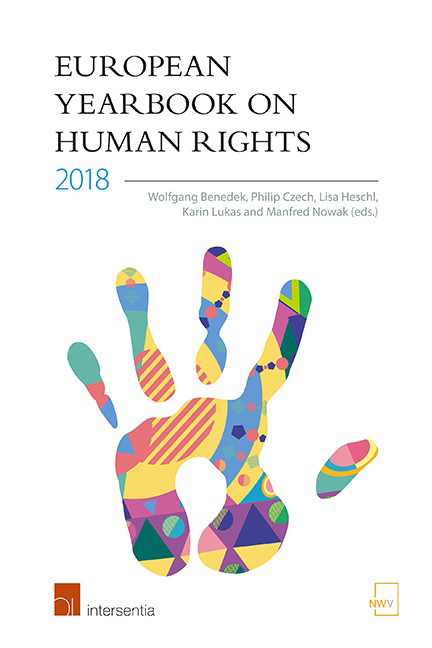Book contents
- Frontmatter
- Scientific Advisory Board
- Editors’ Preface
- Contents
- List of Abbreviations
- List of Contributors
- Part I Topic Of The Year
- Part II Eu
- The Court of Justice of the European Union and Human Rights in 2017
- Understanding Resettlement Through the Prism of Human Rights: A Case Study on the Resettlement in Belgium of Syrian Refugees from Lebanon
- The Decline of Fundamental Rights in CJEU Jurisprudence after the 2015 ‘Refugee Crisis’
- The EU Migration Crisis and the Human Rights Implications of the Externalisation of Border Control
- Does the EU Framework for Roma Integration Promote the Human Rights of Romani Persons in the Union?
- The EU Guidelines on Freedom of Religion or Belief at Their Fifth Anniversary: Implementation Lagging Behind?
- Human Rights Council in Troubled Waters: The EU as a Stabilising Factor
- Part III Coe
- PART IV OSCE
- Part V Others
- Part VI Book Reviews
- Index
The Decline of Fundamental Rights in CJEU Jurisprudence after the 2015 ‘Refugee Crisis’
from Part II - Eu
Published online by Cambridge University Press: 31 January 2019
- Frontmatter
- Scientific Advisory Board
- Editors’ Preface
- Contents
- List of Abbreviations
- List of Contributors
- Part I Topic Of The Year
- Part II Eu
- The Court of Justice of the European Union and Human Rights in 2017
- Understanding Resettlement Through the Prism of Human Rights: A Case Study on the Resettlement in Belgium of Syrian Refugees from Lebanon
- The Decline of Fundamental Rights in CJEU Jurisprudence after the 2015 ‘Refugee Crisis’
- The EU Migration Crisis and the Human Rights Implications of the Externalisation of Border Control
- Does the EU Framework for Roma Integration Promote the Human Rights of Romani Persons in the Union?
- The EU Guidelines on Freedom of Religion or Belief at Their Fifth Anniversary: Implementation Lagging Behind?
- Human Rights Council in Troubled Waters: The EU as a Stabilising Factor
- Part III Coe
- PART IV OSCE
- Part V Others
- Part VI Book Reviews
- Index
Summary
ABSTRACT
In the past, the Court of Justice of the European Union (CJEU) has been one of the driving forces ensuring the compliance of secondary acts adopted under the Common European Asylum System (CEAS) with fundamental rights issues. It even came to be considered a ‘ fundamental rights ‘ Court, often taking a progressive stance in interpreting the relevant norms in light of the Charter of Fundamental Rights (CFREU) and other applicable human and refugee rights norms. While the Court has always been eager to demonstrate its legal integrity preventing second thoughts on its political independence, the proclaimed ‘ refugee crisis ‘ of the last years with the surrounding political turmoil seems to have had an impact on the Court and its approach towards the protection of fundamental rights within the European Union (EU) as well. This article seeks to analyse two judgments X and X and A.S. and Jafari considered exemplary for the shift the CJEU has undergone in the last years. In both cases, the CJEU has had the opportunity to change the course of the CEAS ensuring its compliance with fundamental rights standards. However, as will be shown below, the Court in 2017 has adopted a conservative if not politically motivated approach to CEAS cases.
INTRODUCTION
When in 2015 more than one million people arrived at the shores of the EU, policy makers were quick in proclaiming it a ‘ migration ‘ or ‘ refugee crisis ‘. While 3,771 reported deaths in the Mediterranean and other related tragedies triggered only modest expressions of condolences, the increasing numbers of people applying for asylum provoked a chain reaction with mostly emotional, populist and fear-induced policies adopted at the Member States (MS) level. The crisis rhetoric surrounding the arrivals of people seeking international protection supported the renaissance of unilateral approaches, and soon those arrivals became the stress test for the European project as a whole. With the temporary reintroduction of internal border controls by several MS, the Union seemed to be rudely awakened from its Schengen dream, and the story of the ever-closer Union seemed to have come to an end. One reason why the Union was shaken to the core by the events of 2015 was that structural deficiencies of the CEAS surfaced and revealed that the EU is far from having accomplished a coherent set of norms in the field of asylum.
- Type
- Chapter
- Information
- European Yearbook on Human Rights 2018 , pp. 103 - 134Publisher: IntersentiaPrint publication year: 2018



